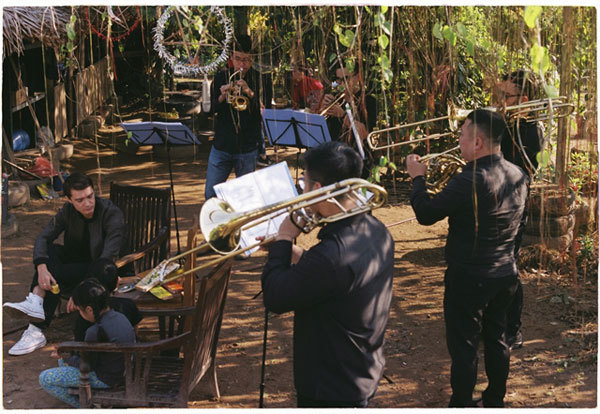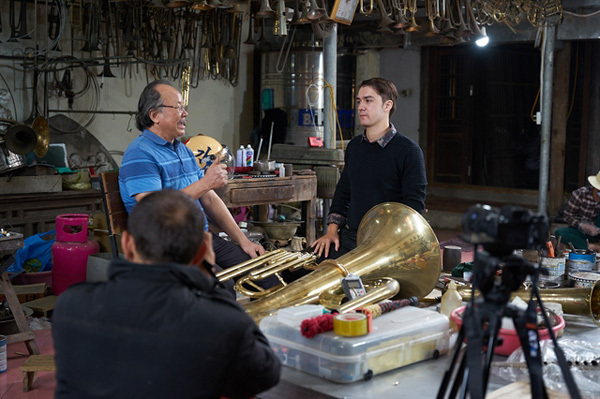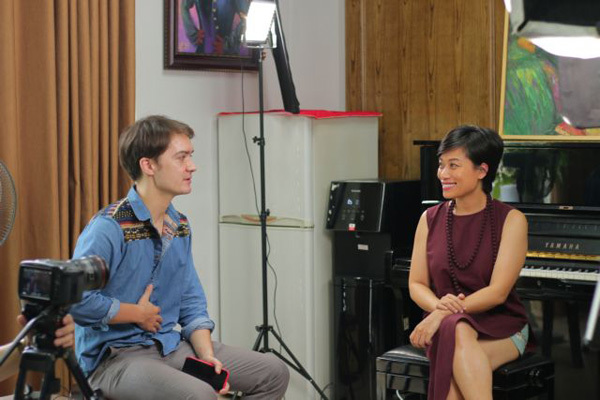 |
| MAKE IT LOUD: François Bibonne (left) with members of the Hanoi Brass Community. Photo courtesy of François Bibonne |
Over the years, it has played host to famed composers and orchestras from around the world, as well as homegrown talents.
The COVID-19 pandemic has impacted all sectors of life, but live entertainment has been particularly susceptible to lockdowns and social distancing measures – with musicians unable to travel and large groups of music lovers barred from grand concert halls.
Until vaccines are rolled out comprehensively, the gap between audience and performer could remain wide for some time to come.
One man attempting to bridge that gap is François Bibonne, a documentary filmmaker from France. François’ connection to the country is familial, as his grandmother is Vietnamese.
With an education in history and prodigious skills on the piano, François is attempting to mix his skills in telling the story of Vietnam’s classical music scene, which has its own unique features.
Set to be released in August, François’ new documentary, Once upon a bridge, in Vietnam, aims to give viewers a taste of the country’s classical music scene and span the distance between East and West.
“This idea of classical music is very different here, because in France, the programmes, we have like Baroque music and contemporary music and classical music and all the stuff, Western classical music. Here they have this, but they also connect that to traditional music and to the Vietnamese folk songs,” François told Việt Nam News.
 |
| MUSIC MAKER: François Bibonne (right) speaks to Nguyen Van Cuong, owner of the Pham Phao Brass factory, for his documentary 'Once upon a bridge, in Vietnam’. Photo courtesy of François Bibonne |
It’s this rich mixture of heritage and diversity, the interplay of age-old traditions and modern trends, that makes the music scene in Vietnam such a satisfying subject to draw upon. As part of his filmmaking process, Bibonne travelled to a number of provinces and regions around Vietnam, all with their own musical roots.
“There's a village [in Bac Giang Province]. They all play the violin for like 70 years. It's like a tradition now, and they all play folk songs there.
“The musicians of the orchestra, they are very aware of their roots. I think more aware than, for example in France. French people, they don't really know about the music roots. We don't know what we, what people used to play, before and at school. We don't know. We don't learn that too much.
“But here I think the Government plays a very strong role, would you say that music heritage, like ca trù, quan họ, chèo. I mean a lot of stuff. These musicians, they collaborate with young musicians to do a project.”
He’s also impressed with projects run by young artists.
“Despite COVID-19 a lot of musicians launched new projects. Some musicians came back from abroad and managed new stuff here. I think of a young cellist called Phan Do Phuc. We've heard [his music event series] ‘Schubert in a Mug’. A Japanese musician, a trumpetist, named Yuki and another trumpetist from VNSO named Xu did Hanoi Brass Week with the Goethe Institute.
“There are a lot of projects like that. And it is very interesting to understand the new generation of Vietnam. So my documentary is from music history, and I want to highlight this new generation to show there is a development of the music scene here.”
It’s this collaborative element that strikes Bibonne as vital to Vietnam’s classical scene – where events and projects are open to all comers, providing a rich opportunity to learn and develop skills and knowledge.
“I went to Yen Bai Province and [there were] a lot of musicians from the Vietnamese music academy.
“They organised concerts to promote, projects to fundraise for bamboo forests. They all play different styles of music, like classical music, but [also] folk songs, songs from the H’Mong tribe.
“These musicians there come from the VNSO or some of them. So, it's really very interesting to see that community, which is involved in different programmes like this.”
 |
| CLASSICAL CONNECTIONS: François Bibonne (left) speaks to Lyly Tran, director of the Vietnam National Opera and Ballet, for his documentary 'Once upon a bridge, in Vietnam’. Photo courtesy of François Bibonne |
François’ documentary is an attempt to capture this community, and the deep links between culture, folk traditions and today’s classical music. In telling the tale of classical music in Vietnam, the young filmmaker also attempts to close that COVID void, and give people back home a better sense of Vietnamese music.
“I want people to travel in Vietnam, especially during COVID-19, as they cannot come here. I’m not working for a travel agency, but [the documentary] is also a trip. It's a trip in Vietnam through music.”
The process of making the documentary was not without its challenges, especially in sourcing interviews during a pandemic on a shoe-string budget. But thanks to the close-knit community of musicians here, Bibonne has managed to attract a number of musicians, performers and experts to talk about their field.
Bibonne wants to draw further on the inspiration he’s garnered here, moving from his documentary film to providing more of a bridge between Vietnamese musicians and classical music worldwide. The first step in this process is of course the film, but also a production company – Studio Thi Koan – named after his grandmother.
“So, one idea of the documentary also is to meet artists in Vietnam and promote them and maybe bring not better, but new visibility, different visibility.
“I'm thinking maybe I can in the future make a production company for the musicians here and connect them to the music scene abroad, not only in France, but maybe in the US or everywhere they want to play and sell them with the videos and record them.”
Source: Vietnam News

Leaving New York, cellist returns to contribute to classical music in Vietnam
Returning to Vietnam last year after more than 10 years studying and working in New York – one of the most bustling cultural hubs in the world – cellist Phan Do Phuc has searched for ways to maintain his talent as a musician.

Maintaining the sound of Khen panpipes
Playing the Khen panpipe and dancing is part of the traditional customs followed by the H’mong ethnic minority people.